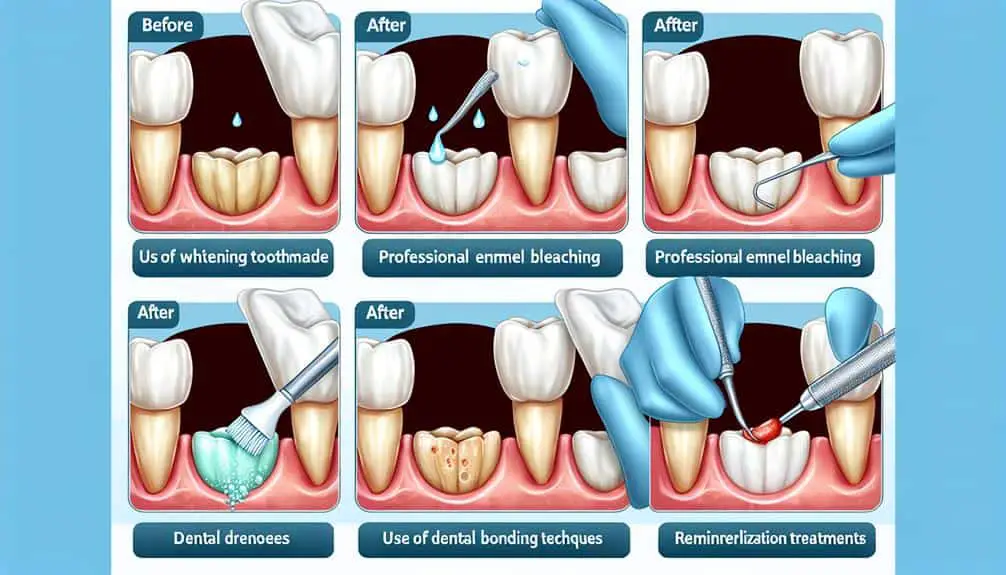To securely whiten your teeth without harming enamel, choose enamel-friendly whitening products containing ingredients like hydrogen peroxide or carbamide peroxide in safe amounts. Select products with custom-fit trays for consistent application, and follow instructions carefully to prevent damage. Consider gentle methods like baking soda or activated charcoal, and use a soft-bristled toothbrush in circular motions. After whitening, maintain enamel health by using desensitizing toothpaste and avoiding acidic foods. Make sure to consult your dentist for personalized advice on whitening and enamel protection to keep your teeth white and healthy.
Key Points
- Choose whitening products with safe ingredients like hydrogen peroxide.
- Use custom-fit trays for even application and enamel protection.
- Avoid harsh abrasives and high acid levels to prevent enamel damage.
- Consider natural remedies like baking soda for gentle whitening.
- Maintain enamel health post-whitening with desensitizing toothpaste and regular check-ups.
Understanding Enamel and Whitening
Understanding how enamel works and reacts to whitening treatments is vital for safely achieving a brighter smile. Enamel protection is a crucial aspect when considering teeth whitening. Enamel is the outer layer of your teeth and acts as a protective barrier. While whitening can enhance the color of your teeth, it's essential to make sure that the enamel remains strong and intact throughout the process.
One of the common whitening myths is that stronger whitening products lead to better results. However, this isn't necessarily true. Harsh chemicals in strong whitening products can damage the enamel, leading to increased sensitivity and other oral health issues. It's important to choose whitening treatments that are enamel-safe to prevent any long-term damage to your teeth.
Choosing Enamel-Safe Whitening Products
For the most important teeth whitening experience, prioritize selecting whitening products that are gentle on your enamel. When choosing enamel-safe whitening products, it's vital to pay attention to the ingredients they contain. Look for products that use ingredients like hydrogen peroxide or carbamide peroxide in safe concentrations to minimize the risk of enamel damage. Avoid products with harsh abrasives or high levels of acids, as these can wear down the enamel over time.
Additionally, consider the application methods of the whitening products. Opt for whitening products that come with custom-fit trays or strips to guarantee even application and minimize contact with the gums, which can be sensitive to the whitening agents. Follow the manufacturer's instructions carefully to prevent overuse or misuse of the product, which can lead to enamel erosion.
Adopting Gentle Whitening Techniques
To guarantee safe and effective teeth whitening, it's important to utilize gentle whitening techniques that prioritize the health of your enamel. Here are some tips to help you achieve a brighter smile without compromising the integrity of your teeth:
- Natural Remedies: Consider using natural ingredients like baking soda or activated charcoal as gentle alternatives to harsh chemical whitening agents.
- DIY Solutions: Explore DIY whitening solutions such as hydrogen peroxide mixed with water or coconut oil pulling, which can help gently lift surface stains without damaging your enamel.
- Be Gentle: When brushing your teeth, opt for a soft-bristled toothbrush and gentle, circular motions to avoid abrasive actions that can wear down enamel.
- Regular Maintenance: Maintain good oral hygiene practices like regular brushing, flossing, and dental check-ups to ensure your teeth stay healthy and white in the long run.
Maintaining Enamel Health Post-Whitening
Maintain the health of your enamel post-whitening by following important oral care practices and being mindful of potential factors that could affect your teeth's integrity. To prevent sensitivity after whitening, consider using desensitizing toothpaste or fluoride mouthwash. These products can help strengthen your enamel and reduce discomfort. Additionally, be cautious with your post-whitening diet. Avoid consuming acidic foods and beverages that can erode enamel, such as citrus fruits, sodas, and coffee. Opt for enamel-friendly options like dairy products, leafy greens, and lean proteins to promote enamel health.
Consistent oral hygiene is essential post-whitening. Brush gently with a soft-bristled toothbrush and non-abrasive toothpaste to avoid damaging your enamel. Floss daily to remove plaque and debris that could compromise enamel integrity. Regular dental check-ups are vital for monitoring your enamel health and addressing any concerns promptly. By practicing good oral habits and being mindful of your diet, you can maintain a healthy enamel post-whitening and enjoy a bright, radiant smile for years to come.
Consulting Your Dentist for Guidance
When seeking guidance post-teeth whitening, consulting your dentist is essential for personalized recommendations and professional advice on maintaining excellent oral health. Your dentist can provide tailored guidance to make sure your teeth stay healthy and white for the long term.
Here are some reasons why consulting your dentist is vital:
- Dental Checkups: Regular dental checkups are important to monitor your oral health, identify any issues early on, and provide necessary interventions to sustain your bright smile.
- Professional Advice: Dentists can offer expert advice on the best whitening methods suitable for your teeth, ensuring you achieve the desired results without compromising your oral health.
- Customized Care: Your dentist can create a personalized oral care plan that considers your specific needs, making sure that your teeth remain white, healthy, and free from sensitivity.
- Preventive Measures: Dentists can recommend preventive measures to protect your enamel, such as using fluoride products, to maintain the whiteness of your teeth while safeguarding their strength and integrity.
Frequently Asked Questions
Can Whitening Products Cause Permanent Damage to Tooth Enamel?
When it comes to enamel protection, it's essential to contemplate the long-term effects of whitening products on tooth enamel. Overuse can potentially cause permanent damage, so always follow guidelines and consult professionals for the safest approach.
How Long Should I Wait Before Whitening My Teeth Again After Completing a Whitening Treatment?
Wait at least a month before whitening your teeth again to guarantee proper maintenance. Frequent touch-ups can damage enamel. Following guidelines for waiting periods between treatments is crucial for enamel health and long-term whitening success.
Are There Any Natural Remedies for Whitening Teeth That Are Safe for Enamel?
For natural teeth whitening that's enamel-friendly, consider oil pulling for its effectiveness. Baking soda can be safe, but moderation is key. Always consult with a dentist for personalized advice on maintaining a healthy smile.
Will Whitening Toothpaste Alone Be Enough to Achieve Noticeable Results?
If you're seeking noticeable results, relying solely on whitening toothpaste may not suffice. Professional treatments tend to deliver more dramatic outcomes. Complementing these with effective home remedies can enhance and maintain your bright smile.
Can Certain Foods or Drinks Stain Teeth Even After Whitening Treatments?
Certain foods and drinks like coffee and red wine can still stain teeth even after whitening treatments. To prevent coffee stains, consider drinking through a straw. For red wine discoloration prevention, try swishing water or brushing shortly after consumption.



